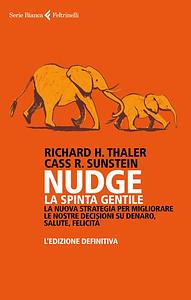Take a photo of a barcode or cover
informative
medium-paced
informative
Unfortunately, this book felt like a chore to finish at times. However, I think the authors did a good job of condensing the material and connecting different research/cases into a general theme.
informative
informative
lighthearted
reflective
fast-paced
Not what i expected, or wanted. Way more global and less personal.
Daniel Kahneman + BF Skinner branded as libertarian paternalism. Good advice, but rife for exploitation. I encountered Thaler first via Charlie Munger, and it's easy to imagine how centralized authority can use the principles of nudging people, but not in their best interests.
This book details how every design we encounter- from how a cafeteria is laid out, how company insurance policies are structured, to even the presentation of terms and conditions- is “nudging” us towards making a certain decision (sometimes completely unintentionally). While some chapters are incredible (with the chapter on how to choose the right health insurance policy being exceptional), many get bogged down in unnecessary detail, example, and research.
Cass Sunstein and Richard Thaler's Nudge is really a combination of two different books. One is a very interesting analysis of why people make so many irrational, uninformed decision, and how governments and regulators can induce far better results through what the authors term "choice architecture." The second book is an excruciatingly detailed, wonky examination of how choice architecture can improve issues like prescription drug legislation, medical malpractice lawsuits, and other subjects. The first book is well-written and interesting; the second is overly academic and extremely dull (if useful).
Nudge was published 11 years ago and already feels dated — it seems designed for a highly functioning technocracy that no longer exists. In particular, the chapter on same-sex marriage goes to great lengths to preserve the "libertarian" ideal of universal civil unions, never mind that same-sex marriage is now rightfully legal everywhere in America. I don't necessarily fault the authors for failing to predict the future — even many liberals like Obama were not in favor of same-sex unions in 2007 — but it still is evident that Sunstein and Thaler write from a position of privilege.
Nudge isn't a bad book, but it feels like one that was written for a specific moment of history — not ideal for a work of popular social science that was probably intended to stand the test of time.
Nudge was published 11 years ago and already feels dated — it seems designed for a highly functioning technocracy that no longer exists. In particular, the chapter on same-sex marriage goes to great lengths to preserve the "libertarian" ideal of universal civil unions, never mind that same-sex marriage is now rightfully legal everywhere in America. I don't necessarily fault the authors for failing to predict the future — even many liberals like Obama were not in favor of same-sex unions in 2007 — but it still is evident that Sunstein and Thaler write from a position of privilege.
Nudge isn't a bad book, but it feels like one that was written for a specific moment of history — not ideal for a work of popular social science that was probably intended to stand the test of time.

